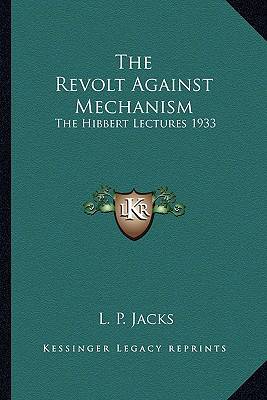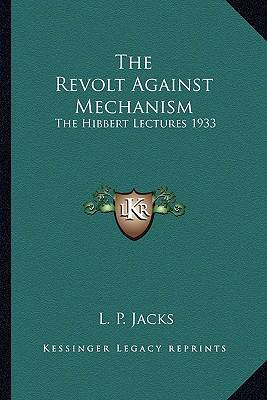
- Afhalen na 1 uur in een winkel met voorraad
- Gratis thuislevering in België vanaf € 30
- Ruim aanbod met 7 miljoen producten
- Afhalen na 1 uur in een winkel met voorraad
- Gratis thuislevering in België vanaf € 30
- Ruim aanbod met 7 miljoen producten
Zoeken
€ 27,45
+ 54 punten
Omschrijving
The Revolt Against Mechanism: The Hibbert Lectures 1933 is a book written by L. P. Jacks that explores the philosophical and cultural movements that emerged in the early 20th century as a response to the mechanistic worldview that had dominated Western thought since the Enlightenment. The book is based on a series of lectures that Jacks delivered in 1933 as part of the prestigious Hibbert Lectures, which have been delivered annually since 1880 on topics related to religion, philosophy, and ethics.In the book, Jacks argues that the mechanistic worldview, which sees the universe as a vast machine governed by deterministic laws, has led to a devaluation of human values and a loss of spiritual meaning in modern life. He traces the origins of this worldview to the scientific revolution of the 17th century and the rise of Enlightenment rationalism, and shows how it has been reinforced by the industrialization and technological progress of the modern era.Jacks then explores the various movements that have emerged in response to this mechanistic worldview, including Romanticism, existentialism, and the religious revivalism of the early 20th century. He argues that these movements represent a revolt against the reduction of human experience to mere matter and mechanism, and a reaffirmation of the importance of subjective experience, intuition, and spiritual values.Overall, The Revolt Against Mechanism is a thought-provoking and insightful exploration of the cultural and philosophical trends that have shaped modern Western thought, and a call to reexamine our assumptions about the nature of reality and the meaning of human existence.This scarce antiquarian book is a facsimile reprint of the old original and may contain some imperfections such as library marks and notations. Because we believe this work is culturally important, we have made it available as part of our commitment for protecting, preserving, and promoting the world's literature in affordable, high quality, modern editions, that are true to their original work.
Specificaties
Betrokkenen
- Auteur(s):
- Uitgeverij:
Inhoud
- Aantal bladzijden:
- 78
- Taal:
- Engels
Eigenschappen
- Productcode (EAN):
- 9781162751078
- Verschijningsdatum:
- 10/09/2010
- Uitvoering:
- Paperback
- Formaat:
- Trade paperback (VS)
- Afmetingen:
- 152 mm x 229 mm
- Gewicht:
- 117 g

Alleen bij Standaard Boekhandel
+ 54 punten op je klantenkaart van Standaard Boekhandel
Beoordelingen
We publiceren alleen reviews die voldoen aan de voorwaarden voor reviews. Bekijk onze voorwaarden voor reviews.











